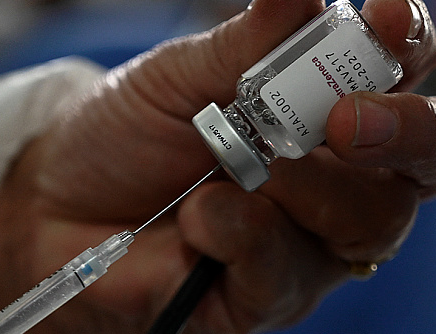
A British study found that protection from either of the two most commonly used COVID-19 vaccines against the Delta variant weakens within three months.
Highlighting the increased risk of contagion from the Delta variant, the study also showed that those who do get infected despite being fully vaccinated tend to have a viral load similar to the unvaccinated with an infection, a clear deterioration from when the Alpha variant was still dominant in Britain.
The Oxford findings are in line with an analysis by the U.S. Centers for Disease Control and Prevention (CDC) and come as the U.S. government outlines plans to make COVID-19 vaccine booster shots widely available next month amid a rise in Delta variant infections. It has cited data indicating diminishing protection from the vaccines over time.
Israel began administering third Pfizer doses last month to confront a surge in local infections driven by Delta. Several European countries are also expected to begin offering boosters to the elderly and people with weak immune systems.
Pfizer has said its vaccine's efficacy drops over time. Last month AstraZeneca said it was still looking into how long its vaccine's protection lasts and whether a booster dose would be needed to keep up immunity.
"The fact that we do see more viral load hints (...) that indeed herd immunity might become more challenging," said co-author Koen Pouwels, also of Oxford University.
Herd immunity is when a large enough portion of the population is immune to a pathogen, either by vaccination or prior infection, stopping infection numbers from growing.
"Vaccines are probably best at preventing severe disease and slightly less at preventing transmission," said Pouwels.
The authors cautioned that the viral concentration in the throat was only a rough proxy for the severity of symptoms and that they had no new data on the duration of infections.
The survey, which has yet to be peer-reviewed before publication in a scientific journal, underscores concerns by scientists that the Delta variant, first identified in India, can infect fully vaccinated people at a greater rate than previous lineages, and that the vaccinated could more easily transmit it.
To contrast periods before and after Delta became prevalent, the Oxford researchers analyzed about 2.58 million swabs taken from 380,000 randomly picked adults between Dec. 1, 2020, and May 16, 2021, and 810,000 test results from 360,000 participants between May 17 and Aug. 1.
The study was conducted in partnership with Britain's Office of National Statistics (ONS) and the Department for Health and Social Care (DHSC).
- Biden And Netanyahu Discuss Gaza Ceasefire
- Jul 26, 2024
- Paris Olympic Will Start On Saturday
- Jul 25, 2024
- IOC Names Hosts Of Winter Games
- Jul 25, 2024
- 85 % Paddy Plantation Completes Nationwide
- Jul 24, 2024
- Kamala Harris Hits Presidential Campaign Trail
- Jul 24, 2024
















